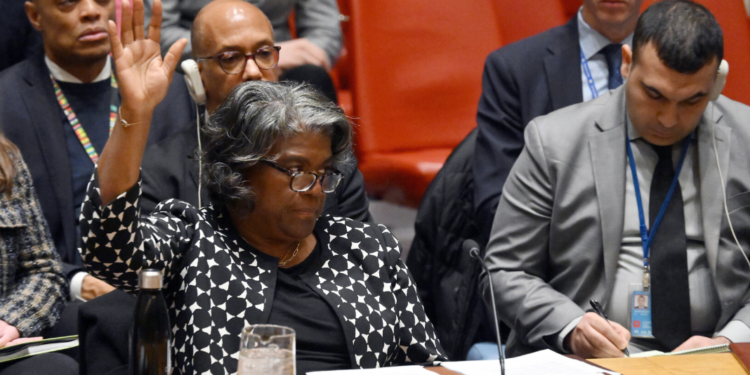Nov 22, 2024 Story by: Editor
New York – U.S. Ambassador to the United Nations, Linda Thomas-Greenfield, has defended the United States’ frequent use of its veto power in the U.N. Security Council since the Gaza genocide erupted on October 7, 2023. She emphasized that the veto is a tool employed to safeguard American interests.
The U.S. has exercised its veto five times during this period, rejecting three resolutions calling to stop the bloodshed and for a ceasefire in Gaza, a Russian oral amendment, and a proposal advocating full Palestinian membership in the United Nations.
In an interview with Al-Araby Al-Jadeed, The New Arab’s sister publication, Thomas-Greenfield stated on Tuesday, “The U.S. uses its veto power to promote the interests of the U.S. Government.”
“That’s how we have used that veto consistently over many years in the Council…people think it leads to dysfunction, but for us, it is power that we have, and we do use that power. I’m not going to make any excuses for it. It is something that is within the toolbox of things that we can bring to the table in the Security Council,” she explained.
The ambassador addressed the media during a press conference outlining U.S. priorities for the upcoming high-level meetings at the General Assembly, where world leaders will gather. While defending the U.S. veto record, Thomas-Greenfield criticized Russia for vetoing resolutions related to the war in Ukraine.
When questioned by an Al-Araby Al-Jadeed journalist about whether the U.S. should cease military support for Israel to halt the bloodshed in Gaza, she remarked, “On the issues related to the Middle East, we want to see peace, and that’s what President Biden has worked for. But at the same time, we have been clear that we support Israel’s right to self-defense…as an ally, we have provided support to them to defend themselves.”
She added, “That does not mean we in any way want to see this war continue. We want to see this war end. And I know that President Biden has put every ounce of effort that he has in his power to try to find a solution, to get us to a ceasefire, and move us to where we all know we need to move, and that is to a two-state solution.”
Thomas-Greenfield began her briefing by emphasizing the importance of “silencing the guns” in conflicts worldwide. Addressing a question about the International Court of Justice (ICJ) ruling on Palestine and the Israeli occupation, she said, “We respect the ICJ. We have worked to support the ICJ, and we have – while we disagree with some of the decisions that have been made, we continue to work with the ICJ.”
The U.N. General Assembly, meanwhile, began deliberations on Tuesday on a resolution addressing the ICJ’s advisory opinion issued in July, which condemned Israel’s occupation of Palestinian territories since 1967. The resolution proposes implementing practical measures, including “ending the occupation within twelve months.”
The ICJ ruled on July 19 that Israel’s prolonged occupation of Palestinian territories is “illegal.” The court urged Israel to end the occupation promptly, provide reparations to affected individuals, return land occupied in 1967, dismantle the separation wall, halt new settlement activities, and reject the legitimacy of Israel’s presence in the occupied territories.
When asked about the U.S. stance on the draft resolution slated for a vote on Wednesday, Thomas-Greenfield criticized its approach, saying, “As it relates to the resolution that’s being proposed by the Palestinians, I think it has a significant number of flaws, particularly as it interprets what the ICJ has said. It goes much further than the actual decision of the ICJ.”
She elaborated, “It is also our view that the resolution, among many defects that it has, doesn’t recognize that Hamas is a terrorist organization, that Hamas actually controls Gaza – it is not the Palestinian Authority – and that it’s exerting a significant amount of power and influence in Gaza. It doesn’t recognize that Israel has a right to defend itself against what Hamas is doing. So in our view, the resolution does not bring about tangible benefits across the board for the Palestinian people. I think it could complicate the situation on the ground, complicate what we’re trying to do to end the conflict, and I think it impedes reinvigorating steps toward a two-state solution.” Source: New Arab

















